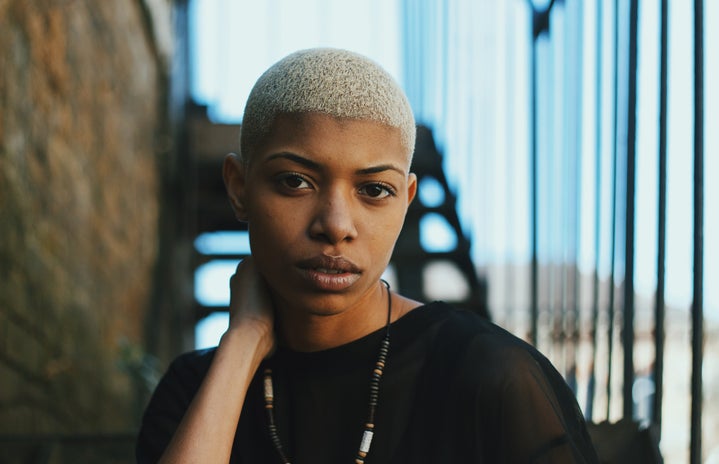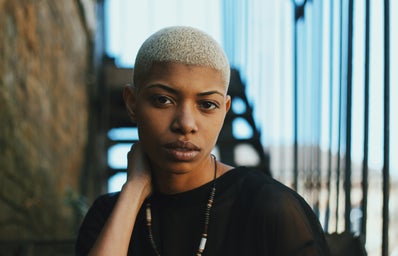The older I get, the more I understand why Britney Spears shaved her head back in 2007. I was only 10 years old at the time and easily fell into the paparazzi’s trap, believing her to be hysterical and having a breakdown. Though now, as someone who has a much better grasp of ableism, mental illness and the oppressive conservatorship that trapped her, I totally get it.
“I just don’t want anybody, anybody touching my head. I don’t want anyone touching my hair. I’m sick of people touching my hair,” Britney apparently said that night. Honestly, justified.
I grew up with super curly hair and spent many childhood nights crying as my mom attempted to detangle it. On days when my hair looked good, it became the envy of random people. I became angry when strangers on the bus would touch my hair like I was a stray dog. In high school, I would take kitchen scissors to my curls at the first signs of boredom. The drugstore being within walking distance meant I always had access to foul-smelling bleach and Manic Panic hair dye. By the time the pandemic started, I had nearly bleached my hair straight. It always felt like straw. I’d keep it in two braids or a slicked back bun at all times, as if wishing the curls would go away. By the time 2019 was ending, I couldn’t handle it anymore. I wanted it to be gone at any cost. In December, I stepped into a hair salon for the first time in years, citing Halle Berry’s 2002 look in the movie Die Another Day as my main inspiration, wanting a cool but easy hairstyle for an upcoming trip to Europe in January. With probably a pound of hair cut off, it was a mental weight lifted. For the first time in my life, I loved my hair. Finally, people stopped touching my hair without my consent. I felt confident without makeup and loved the idea of having my hair grow in a natural and healthy way, for the first time in my life.
When you look at Black women in general, [hair] is a part of our culture, it’s a part of our history.
Chikumo Fiseko
By the time March 2020 rolled around, I was ready to go short again. But I didn’t want just another cult pixie cut. I had an overwhelming urge to shave it all off. Maybe it was about control: We were all stuck in some variation of the same international pandemic. I lived with at-risk people. Everyone in my family lost their jobs. My hair had always been a way to express myself, even if it was only dyeing it a weird colour, just to see if I could.
I felt myself growing frustrated with how the government was reacting (or rather, not reacting) to the pandemic. All of a sudden, it felt like changing my hair was the only way to gain some semblance to define my life. And wouldn’t you know it, all across Instagram and TikTok, I saw people (mostly women) rocking buzzcuts. I saw people oozing with confidence, expressing their gender identity, and just overall, feeling free without their hair. I talked to two women, Cassidy Styles from Sudbury, Ontario and Chikumo Fiseko, a UK-based writer, to see how their pandemic buzz cuts have changed their mental health, two years later.
Chikumo’s reasoning was just like mine. She grew up relaxing her hair. The process, which involves chemically straightening your hair, is not uncommon for those of us who grew up Black (like her) or biracial (like me). For Chikumo, cutting her hair off, at first, was about convenience. Like me, she was going on a trip and didn’t want to worry about struggling with her hair. As the pandemic took over the world, she realized that her hair was intrinsic to her identity. And resting your own identity on your terms is seriously empowering.
“Obviously, when you look at Black women in general, it’s a part of our culture, it’s a part of our history, it’s a part of who we are, just generally,” she says. “Our hair, in general, tells a story. It helps us express who we are.”
But as Chikumo and I spoke on video chat, it seemed obvious that her hair was linked not just to who she was as a person, but to her history. Though she grew up in the United Kingdom, her family comes from Zambia. Having a buzzcut meant that she could learn how important natural hair is to her culture.
“What story does that tell for me? And how do I then learn how my ancestors have done things?” she asks rhetorically. “Rather than trying to find people [on] YouTube, for example, with massive followings, I went looking for fellow Zambians, and people that would have a closer understanding of the climate and how our hair should be. And that helped me interact with other bloggers and other people in the spaces that I’ve now become friends with.”
She tells me that having a new connection to her culture has helped with her mental health. She says it’s incredible how much we don’t realize our hair is linked to how we perceive ourselves.
“I never would’ve thought it’s as linked as it is,” she says. “My hair meant a lot more to my hair than I realized because I cut it out of convenience, and then all of a sudden, I went on this journey of rediscovering myself, looking at beauty [and] looking at how I looked at myself.”
We don’t talk about how closely our identity is tied to our hair the same way we talk about our fashion sense or our makeup. But hair is different – more permanent, somehow. When I first shaved my head, there was an immediate realization that there was no coming back. Or, at least, my hair wouldn’t be growing back for a very long time.
For Cassidy, cutting her hair was an act of rebellion. It was about gaining control over her appearance when her hair became more about her church’s expectations than her own preferences.
“I grew up in a very religious environment, and in Christianity, hair is kind of viewed as ‘the woman’s glory.’ So when I was growing up, it kind of felt like my hair was something that was really important –– but [only] to other people,” she says. She explains to me that her identity was assigned to her as the girl with the beautiful, long, curly hair. Any time she cut it, she was met with criticism and judgement that she couldn’t shake off.
“So, this voice kind of developed in my head where it’s like, ‘Longer equates beautiful, and if I have longer hair, people will think that I’m pretty. But now my hair is short and short hair equals ugly. And if my hair is ugly, then I’m ugly,’” she explains. “And after that, I kind of let it grow long. I feel like I kind of went super-feminine with it all.”
I feel like a lot of our identity is attached to our hair because we’re told that it has to be.
Cassidy Styles
Reflecting on her appearance inside the church isn’t anything new to Cassidy. In many communities, women having long hair go hand in hand with dressing modestly. And if that’s what you want to do, more power to you — your body, your choice, after all. But the problem arises when it’s no longer your choice, and the community that’s supposed to be supporting you is judging you. Cassidy explains that she felt ignored because there was so much emphasis on her hair.
“There [are] all of these really cool, wonderful things that make me [the person I am], and it was always coming second to my appearance and what other people thought I should look like,” she says. “It was at that point when I had shaved all my hair off [that] I had nothing left, I was like, ‘Now things are kind of on my own terms.’”
Cassidy, just like me, only shaved her head the one time during the pandemic. But even though she’s growing it out, she finally feels like it’s her choice this time. And, just like Chikumo, Cassidy finds an indiscernible link between identity, hair and conventional notions of beauty.
“I think that a lot of our identity is tied to our hair because it becomes part of our identity. It’s not until it’s all gone or you shave it yourself that you’re kind of like, ‘Okay, what am I now that one of the most defining factors of my physical appearance is not there anymore?’” she says. “I also think it kind of has a lot to do with conventional beauty standards that have been set, where it’s convinced us all that we need to look a certain way; our hair needs to look a certain way in order for us to be perceived a certain way. I feel like a lot of our identity is attached to our hair because we’re told that it has to be.”
Chikumo also suggests that shaving your hair is a perfect way to recreate yourself, by yourself. But this isn’t to say that if you don’t have hair, you don’t have an identity. But when women choose buzz cuts, they’re opting to create their own beauty while simultaneously giving the middle finger to anyone saying what a woman needs to do in order to look and feel beautiful.
“I know it sounds really cliché — but it was more like a rebirth. It was starting to build who I wanted to be on my terms, rather than anyone [else’s],” Chikumo says. “I was like, ‘Actually, this is kind of my chance to rebuild myself and rebuild my life in terms of how I want myself to look and how I want myself to feel and how I want myself to be.’ It’s not about Western standards in terms of beauty.”
While both Chikumo and Cassidy embarked on very different experiences of self-discovery with their pandemic buzz cuts, there’s one thing for sure: They both recommend doing it.
“Give yourself the chance to see what happens when you cut your hair, and [recognize] the way you feel and the person that [comes] out of it. Because it can grow back; you can relax it, you can do whatever else you want to it,” Chikumo explains. “But there’s no point pigeon-holing yourself just because of what other people think.”
Cassidy’s parting words were nearly the same. “Not to sound cheesy — but it’s liberating, in a sense. And you do find that sometimes you can [discover] a new relationship with yourself and how other people see you and what you personally identify as ‘attractive’ for yourself.”


